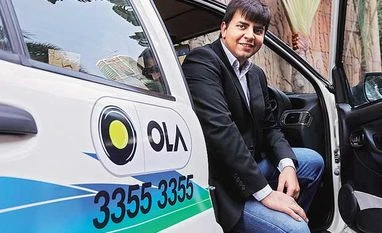Rival Ola, the Business Standard Start-Up award winner, which is loosely modelled on Uber, then had customers dialling a call centre to book taxis. In two years, Ola shifted to an app-based model, while driving local innovations with the aim of being one up on Uber.
Flush with funds - nearly $1.2 billion raised from marquee investors - and global alliances with Didi Kuadi, Grabtaxi and Lyft, ANI Technologies (the firm that operates Ola Cabs) is holding strong against Uber, which has committed $1 billion investments in India.
Also Read
Ola now has over 350,000 partners in 102 cities, and claims a market share of over 80 per cent. (Uber claims a market share of over 40 per cent with 250,000 driver-partners in 22 cities.) While Ola is ahead, co-founder and CEO Bhavish Aggarwal, 29, is not taking chances.
"If we win customers, we don't have to worry about competition," he says.
Aggarwal started Ola along with Ankit Bhati in Mumbai in 2010 as a taxi aggregator. As business grew, he moved to Bengaluru to scale up and get talent, key for technology-intensive businesses.
Aggarwal is confident that he will play a part in redefining transport not just in choked metros but also in smaller towns.
"There are lots of opportunities to improve transportation across India. I believe in reducing traffic in the cities," he says. "I don't own a car; the youth is not buying a car."
This confidence is leading Aggarwal to consolidate the drivers on his network to ensure they remain locked in to serve his customers better. Ola has expanded into products such as Ola Share (sharing rides with trusted people), Ola Prime (premium sedans and SUVs with better drivers) and Ola Money (e-wallet), opened its application programming interface (API), and allows other developers such as Oyo Rooms to build a solution that allows secure sharing of data with partners.
The data sharing helps other firms to build applications around Ola's app, helping it to reach out to more customers while offering convenience in booking a cab or transferring money. It has also opened up its app for carpooling by private cars, which will allow decongestion of traffic in large metros.
In 2013-14 Ola reported losses of Rs 34.21 crore on revenues of Rs 51.05 crore, according to filings with the Registrar of Companies. (The latest numbers are not available.) But Aggarwal says the firm is profitable in a few cities and is continuing to invest, to grow.
In March 2015 Ola acquired cab service company TaxiForSure for about $200 million, and integrated it on its app. It has also expanded to include auto rickshaws, yellow cabs in Mumbai and Kolkata, food pick-up from restaurants, a hyperlocal grocery delivery service, and mini buses to take passengers from point to point on select routes in Bengaluru on a pilot basis. It has also begun leasing vehicles, and expects to lease over 100,000 vehicles in coming years.
Ola could be a big customer for car manufacturers as it expands its network to over 200 cities this year. "We will buy the cars (from manufacturers). Our drivers will own the cars," Aggarwal says.
Payments is another space Ola is sinking its teeth into. The company has started its Ola Money service which at first only allowed users to pay for cab rides, but has now been opened up to third-party services. However, Ola will have to fight for a share in the mobile payments market, which has an abundance of wallet services.
)